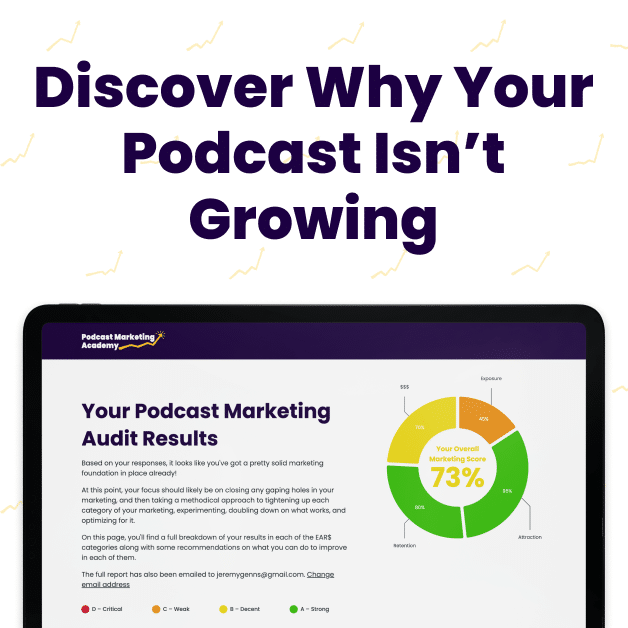As a podcaster, it’s easy to look at platforms like TikTok and YouTube and get a little wistful.
So many podcast hosts imagine that if only podcasting had a universal discoverability engine similar to those platforms, their shows would have an easier time finding and growing an audience.
An advanced recommendations algorithm, the thinking goes, would allow us as creators to focus 100% of our time and effort on creating great content… which listeners would then easily be able to find with little or no effort from us.
Simple.
Elegant.
And unfortunately, unlikely to make marketing our shows much easier.
To understand why centralized podcast discovery won’t make marketing any easier, we don’t need to look further than YouTube’s extremely efficient recommendation engine.
One study in 2016 showed that just 3 percent of YouTube channels accounted for 90% of all viewing on the platform.
In other words, roughly the same as the current situation in podcasting.
But it’s not just podcasting.
This distribution, known as a Power Law shows up everywhere.
From follower counts on a given social media platform, to book sales to product sales in every imaginable category on Amazon, to city population sizes in a given area, species extinction rates, body mass, and more!
In short, Power Law distribution curves are something of a law of nature.
And a recommendation engine won’t suddenly remove podcasting from the list of areas it governs.
Why?
With a discovery algorithm in place, the popular content gets recommended more, making it more popular and eating up more of the consumption share, while content that doesn’t play directly into what the algorithm rewards gets—effectively—suppressed.
And when the algorithm dictates your discoverability, two things happen.
- Creators have to appease the algorithm If you want the algorithm to recommend your show, you have to create the kind of content the algorithm rewards in the format and style the algorithm rewards. Likely, that means shorter, more opinionated and less nuanced… in other words, stripping the content of many the attributes that make podcasting special.
- An arms race ensues Far from the discovery engine freeing creators from marketing, if they want their shows to be discovered, they need to spend an enormous amount of time studying how the algorithm works in order to create content that gets promoted.
Consider Mr. Beast.
He started uploading videos to YouTube more than 10 years ago.
Even with YouTube’s recommendation engine, it took him 3 years to reach 2000 subscribers.
He recorded literally thousands of videos before he first broke 1M views on a single video.
And throughout that time, he was obsessively studying the algorithm.
“We were all super small YouTubers and we basically talked every day for a thousand days in a row and did nothing but just like hyper study like what makes a good video, what makes a good thumbnail, what is good pacing… like how to go viral.
We would get on skype every morning, some days I’d get on Skype at 7am and I’d be on the call until like 10 pm and then I’d go to bed, wake up and do it again.
We did things like take a thousand thumbnails and see if like there’s a correlation to the brightness of the thumbnail to how many views it got, or for videos that get over 10 million views, how often do they cut the camera angles?
We were very religious about it and so that’s that’s where most of my knowledge came from is i just surround myself with these lunatics and we didn’t do anything, we had no life, but everybody had sort of a similar vision.
They say 10,000 hours to master something. We probably put in 40 to 50,000 hours,”
The lesson of Mr Beast is that there is no cure-all.
No silver bullet.
No escaping the work that goes into getting new listeners, whether you’re doing discoverability yourself or an algorithm is doing it for you.
Which means that sooner or later, if you’re serious about growing your show and your business, you need to put in the work and learn marketing.
The good news is that learning the basics of marketing is far less time intensive than decoding the YouTube algorithm.
In fact, good marketing boils down to being able to answer just a few simple questions:
- If I could choose any 10,000 people to be my listeners, who would they be and what would they have in common?
- What makes my show the very best show on my topic for those people?
- Where are those people already congregating and how can I show up regularly in those spaces?
These questions aren’t always easy to answer, but they certainly won’t take 10, 40, or 50,000 hours to answer.
And once you have your answers, discoverability ceases to be a problem.
Because you’ll know where to find your ideal listeners are and why they’ll care about your show.
Then, all you need to do is show up.





